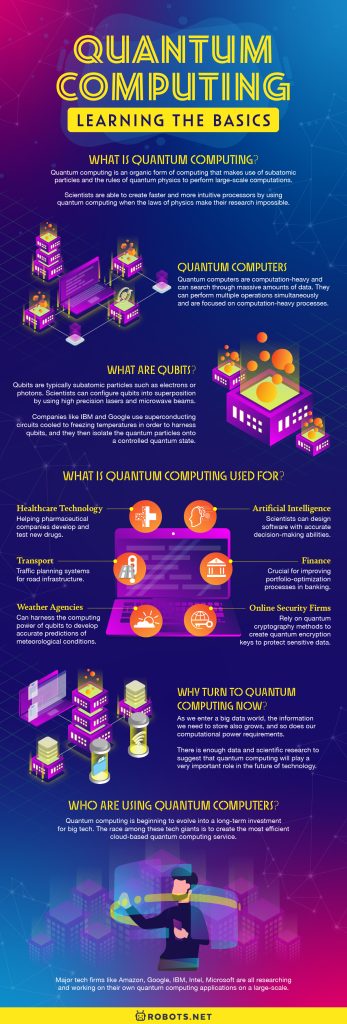Quantum computing stands at the threshold of revolutionizing myriad domains by harnessing the esoteric principles of quantum mechanics. As this field continues its rapid evolution, a simultaneous surge in public interest accompanies it. Many are compelled by the prospect of a computational paradigm that challenges classical logic. This article elucidates the foundational concepts essential for anyone keen on mastering the rudimentary aspects of quantum computing.
To comprehend quantum computing, one must first engage with the fundamental principles of quantum mechanics. At its core, quantum mechanics delineates the behavior of matter and energy at subatomic scales, where particles exhibit perplexing dualities and non-intuitive behaviors. The principles of superposition, entanglement, and uncertainty compose a trifecta that forms the bedrock of quantum theory. These concepts engender the unique properties that distinguish quantum computers from their classical counterparts.
Superposition is perhaps the most mind-bending aspect of quantum mechanics. While classical bits can exist in one of two states (0 or 1), quantum bits, or qubits, can exist simultaneously in both states. This ability to be in multiple states enhances the computational capacity exponentially. One can visualize this phenomenon through the analogy of spinning a coin, which remains in an indeterminate state until measured, much like a qubit before observation.
Next, entanglement manifests as an interdependence between qubits such that the state of one qubit can instantaneously influence another, irrespective of the distance separating them. This poignant characteristic not only allows for remarkable parallel processing capabilities but also invites contemplation on the nature of reality itself. The implications of entangled states stretch beyond computation and beckon philosophical inquiries into the interconnectedness of matter.
The principle of uncertainty, articulated by Heisenberg, posits limits on the precision with which pairs of physical properties can be known. This inherent uncertainty complicates conventional computation but also presents avenues for developing algorithms that capitalize on probabilistic outcomes. By embracing uncertainty, quantum algorithms can traverse an expansive problem space far more efficiently than classical algorithms.
Having outlined the foundational principles, one can now delve into the practical aspects of learning about quantum computing. Individuals intrigued by this field should start by engaging with accessible literature that simplifies complex topics without compromising scientific integrity. Books such as “Quantum Computing for Everyone” by Chris Bernhardt provide an approachable introduction. These texts are designed to elucidate core concepts, accommodating readers without extensive backgrounds in physics or computer science.
Following a literature-based approach, it is prudent to leverage online resources and courses. Numerous platforms, such as Coursera, edX, and Udacity, offer specialized courses in quantum computing. These courses frequently combine video lectures, reading materials, and interactive programming assignments, fostering a multifaceted learning experience. Notably, IBM’s Quantum Experience presents a unique opportunity to engage directly with a cloud-based quantum computer, thus converting theoretical knowledge into practical experience.
In parallel to theoretical understanding, possessing a fundamental grasp of linear algebra is indispensable. Quantum computing operates on vector spaces and complex numbers, making the mathematical underpinnings crucial for adept handling of quantum algorithms. Proficiency in concepts such as matrices, eigenvalues, and inner products significantly enhances one’s capability to interpret quantum operations. Numerous resources are available online, including Khan Academy and MIT OpenCourseWare, which cater to learners seeking to solidify their mathematical foundation.
Moreover, programming is an essential skill for aspiring quantum computer scientists. Familiarity with classical programming languages, such as Python, serves as an excellent stepping stone. Quantum programming frameworks such as Qiskit, Cirq, and Quipper facilitate engagement with quantum algorithms and circuits. By experimenting with these tools, learners can synthesize their theoretical knowledge with practical skills, exploring algorithms like Grover’s search or Shor’s factorization, which exemplify quantum supremacy.
In addition to structured courses and self-study, it is pivotal to engage with the quantum computing community. Participating in forums, attending webinars, and joining local meetups fosters intellectual exchange and enhances learning. Platforms like Stack Exchange and Quantum Computing Stack Exchange specifically cater to curious minds, welcoming questions and discussions that can illuminate complex topics. Collaboration with peers and mentors in the field may further propel one’s understanding, enriching perspectives through shared experiences and insights.
Furthermore, staying abreast of current developments in quantum computing is essential for anyone wishing to grasp the nuances of the field. A plethora of journals and articles address ongoing research and breakthroughs. Subscribing to publications like “Nature Quantum Information” or “Physical Review Letters” allows for exposure to cutting-edge research. In tandem, following organizations like the Quantum Computing Report or specific university departments can yield pertinent news regarding advancements and industry applications.
Ultimately, a relentless curiosity about the cosmos and the foundational concepts of quantum mechanics serves as the bedrock of learning quantum computing. As one’s understanding deepens, so does the appreciation for the intricate tapestry of reality where quantum phenomena thrive. This journey is not merely about mastering a technological skill; it is about participating in a transformative moment in science. By embracing these principles and experiences, individuals can cultivate a comprehensive understanding of quantum computing, opening avenues for exploration that extend far beyond computation itself.












